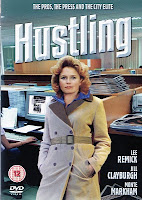
HUSTLING
US, 1975, 98 minutes, Colour.
Lee Remick, Jill Clayburgh, Monte Markham, Melanie Mayron, Alex Rocco, Dick O’ Neil, Burt Young.
Directed by Joseph Sargent.
Hustling is an interesting and grim telemovie about prostitution in American cities. Taking the convention of a newspaper reporter investigating a particular aspect of a city's life, the film brings the problems of prostitution and police supervision and the law into the audience's homes. The strength of the film lies in a crisp screenplay, the playing of Lee Remick as the reporter and Jill Clayburgh, very effective as the central prostitute, before she emerged into stardom in the mid-seventies. A thoughtful kind of film about a sleazy subject.
1. Audience interest in the world of the prostitutes, the world of hustling in New York, the police, the pimps and the reporters? Why the interest, curiosity? Sensationalism, sympathy, social interest?
2. The significance of the title, the meaning of hustling today,its tone? Indicating of a way of life and of values and their lack? Pressure and influence on other people, using them?
3. The quality of this film an a television movie: the television style, documentary and close?ups, episodes, the tone and the topic for home viewing? Did the film have to be toned down for ordinary consumption or was it a realistic treatment? The topic and the treatment, dramatized, geared for information, sympathy, realism? How successful was the film in achieving its aims?
4. The importance of the use of Fran Morrison, and her being played by Lee Remick, for the audience to enter into this world, to be close, yet distant, to test values, understand people, change attitudes? The audience drawing conclusions along with Fran? How valid were these conclusions? Were they in any way manipulated by the screenplay?
5. The picturing of New York, the city and its streets, its ugliness, the various places for the girls, the gaols, the apartments for prostitution, the hotels, the taxis? Did the film give an authentic atmosphere to the kind of world of the hustlers?
6. How sympathetically were the police presented: trying to administer their work, the influence of a political clean?up, sympathy with the press, with political power and money intrigues? The police hassling the prostitutes and hustling themselves? The atmosphere of brutality and violence, exasperation? The sympathy for the police?
7. Audience interest in the girls? The way they were presented, the situations, especially their arrest and at the police station? The explanation of their backgrounds, motivation for being prostitutes, excitement and money? The people that they met? Their interaction amongst themselves?
8. How accurate was the film's presentation of the ugly side of their life: their jealousies and fights, the arrests and the pressurizing, the violence from the pimps, the low expectations out of life, children, the clients and the propositioning? The sequence where Wanda and Steven talk while preparing to be with the man in the apartment?
9. The contrast with Fran and her respectable way of life, her divorce, her hustling in her work, the relationship with her boyfriend? Her moral stances?
10. The atmosphere of the work, Wanda as presented within this context, the interviews and the important dialogue in which she expressed herself and her outlook on life, how convincing was her explanation of herself? Her fears, her interaction with Fran? Their being thrown out of the restaurant? The arrest with the whole group? The effect of Fran's interest on them all, their evening together to celebrate knowledge of the Constitution and people's rights?
11. What happened to Wanda during her interviews with Fran, her being beaten up and robbed, her returning to the pimp, her hopelessness and her hope?
12. The character of the hotel owner and his influence on the girls, the details of his treatment of the girl accused of robbing the client? The moral judgment on this kind of man?
13. The character of Stevie, her worry about her child, her background, the pathos of her death?
14. The contrast and the irony of the high society party, the talk about prostitutes, the moral superiority, the irony of money coming from brothels to support these rich people? The social significance of Fran's investigations, contacts from the police, official records, the potential in the revelation of the truth about where money from prostitution goes? The exasperation of the police chief? The statistics scattered throughout the film?
15. How realistic was the ending? Wanda's change of heart, yet her uncertainty as to whether she would be back? Appropriate for this kind of film?
16. What insight into social and moral problems of the modern world did the film give? What effect, short range and long range, does this kind of film have on the average audience?